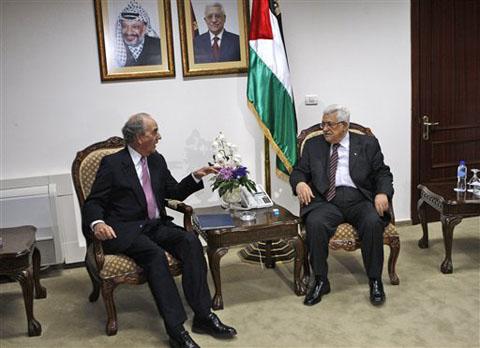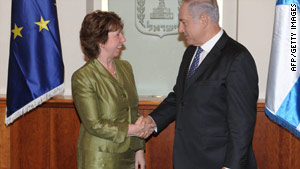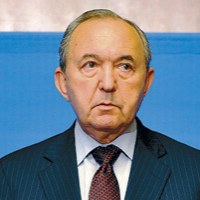![]()
Fri, Oct 01, 2010 | CNN | AP | Reuters | Haaretz | PostChronicle

European Union foreign policy chief Catherine Ashton reads a statement to the media following her meeting with Israeli Prime Minister Benjamin Netanyahu in Jerusalem, October 1, 2010. (REUTERS/Baz Ratner)
European Union Foreign Policy Chief Urges Israel to Reinstate Settlement Freeze
European Union Foreign Policy Chief Catherine Ashton, rushed to the region for talks with Abbas and Netanyahu on Thursday and Friday, underscoring the sense of urgency. A U.S. emissary is also racing against the clock to salvage Mideast peace negotiations facing collapse because of a spat over Israeli settlements. The EU is part of the Middle East Quartet, which also has the United States, Russia and the United Nations.
The European Union foreign policy chief said she urged Israel to reinstate its settlement moratorium and is disappointed that they have not yet done so.
An Israeli settlement freeze expired on Sunday, sparking concern that the controversial issue could become a sticking point that would stall face-to-face talks between Palestinians and Israelis, which resumed last month after an 18-month hiatus.
Catherine Ashton said she had a “positive and constructive dialogue” with U.S. Mideast envoy George Mitchell. She also met with Israeli Prime Minister Benjamin Netanyahu, Palestinian President Mahmoud Abbas, and Palestinian Prime Minister Salam Fayyad. [CNN, Oct 01, 2010; Read more]
Catherine Ashton said that “those of us engaged in the process have been very concerned that the ending of the moratorium puts at risk the possibility of long-term peace. I have urged Israel to continue the moratorium in order to allow the talks more time to make progress. I regret that so far they have chosen not to.”
“Palestinian statehood is critical for any peaceful, workable and lasting solution. Political and financial support from the international community is essential. I urge those who have made financial commitments to deliver on their promises.”
“Gaza is never far from my mind, having visited twice this year, and I continue to call for the crossings to be opened to enable trade — especially the chance for businesses to export. My discussions with the Palestinian Authority have also focused on how we can support exports to allow the people of Gaza to gain a greater stake in their economy and their future.”
“We will continue to offer whatever support we can so the talks continue and a comprehensive and sustainable solution is found, with the state of Israel and the state of Palestine living side by side in peace and security.”
Ashton’s remarks came as U.S. officials, including Secretary of State Clinton, were engaged in intense efforts to find a solution to the crisis in the peace talks caused by the expiration earlier this week of Israel’s ten-month freeze on settlement construction in the West Bank.
Speaking during a meeting with U.S. Mideast envoy Mitchell on Wednesday in Jerusalem, Netanyahu said that he and his government are committed to reaching a peace agreement with the Palestinians.
“There are many doubts and obstacles on the road to peace,” Netanyahu said. “Everyone understands this, but the only way that it is certain we won’t achieve peace is if we don’t try to achieve peace. I am committed to peace and my government is committed to peace.”
“We are committed to achieving peace – a peace that will protect Israel’s security and vital interests,” Netanyahu told Mitchell. “We are committed to going down this route. I hope that the good talks that we’ve started with Abbas will continue to reach an agreement within a year.” [Haaretz, Sept 29, 2010; Read more]

US Special Envoy for Middle East Peace George Mitchell, left, talks with Palestinian President Mahmoud Abbas before their meeting at Abbas' residence, in the West Bank city of Ramallah, 01 Oct 2010
U.S. envoy George Mitchell concluded talks with Palestinian and Israeli leaders on Friday without agreement on how to keep alive peace negotiations that are on hold due to a dispute over Jewish settlement building. He said Israeli Prime Minister Benjamin Netanyahu and Palestinian President Mahmoud Abbas had agreed to keep talking indirectly. He has been shuttling between the leaders for the last two days.
“Both the president and the prime minister have agreed that we will continue our discussions, ongoing in an effort to move forward in this process toward what we all share as a common goal: the establishment of comprehensive peace in the Middle East,” Mitchell told reporters in Ramallah.
“There remain obstacles. Our determination continues,” he said.
Earlier in Jerusalem, Netanyahu said:
“We are making efforts together with Senator Mitchell to continue to hold the talks with President Abbas. We want the talks to continue.”
Abbas says he will pull out of the talks unless Israel extends its freeze on new building in Jewish settlements in the occupied West Bank, which expired this week.
“The key to direct talks is in the hand of the Israeli prime minister. We hope that the Israeli leadership chooses peace and not settlement,” he said after Mitchell’s meeting with Abbas.
Mitchell said he would depart for Qatar, then Egypt and Jordan.
Abbas has said he will take no final decision until the Arab League has discussed the issue. There were indications on Friday that the October 4 date for an Arab League consultation would be set back to October 8 at the request of U.S. ally Egypt. [PostChronicle.com, Oct 01, 2010]
Proposal Rejected
Netanyahu is refusing to extend the construction moratorium and Israeli reports said he had rebuffed a U.S. offer of “very generous” incentives to persuade him to extend it by 60 days.
Obama has invested major political capital in a bid for a Middle East settlement within a year.
Israeli media suggested he was desperate to have Netanyahu agree to keep the talks alive by keeping settlement construction frozen, and was furious at being rebuffed.
A U.S. State Department official denied reports that Obama sent Netanyahu a letter proposing security guarantees, including a continued Israeli troop presence in the Jordan Valley after the creation of a Palestinian state.
But an Israeli official, who requested anonymity, confirmed that “the White House made an offer of incentives to Israel as described in the media but these were rejected by Netanyahu.”
Israel’s Yedioth Ahronoth daily said Obama never signed off on the offer. The security proposals were floated in a paper drawn up last week by Israeli Defense Minister Ehud Barak and White House Middle East aide Dennis Ross, it said. It would have become a “presidential letter” only if Netanyahu accepted.
Obama succeeded in persuading Abbas to resume direct peace talks with Israel on September 2 after a 20-month hiatus but with no overt guarantee from Netanyahu that the settlement freeze he ordered last November would be extended.
Some Israeli political commentators expressed surprise the proposals had been rejected. But they said Netanyahu was afraid of losing power if he got too far out in front of his own governing coalition, which is dominated by pro-settler parties skeptical of peace deals, including his own right-wing Likud. [PostChronicle.com, Oct 01, 2010]



 RSS
RSS











European Union Foreign Policy Chief Urges Israel to Reinstate Settlement Freeze | #EU #Israel #Palestine #peace #US http://j.mp/b35Wu2
[…] for an Arab League consultation would be set back to October 8 at the request of U.S. ally Egypt. [CrethiPlethi.com, Oct 01, […]